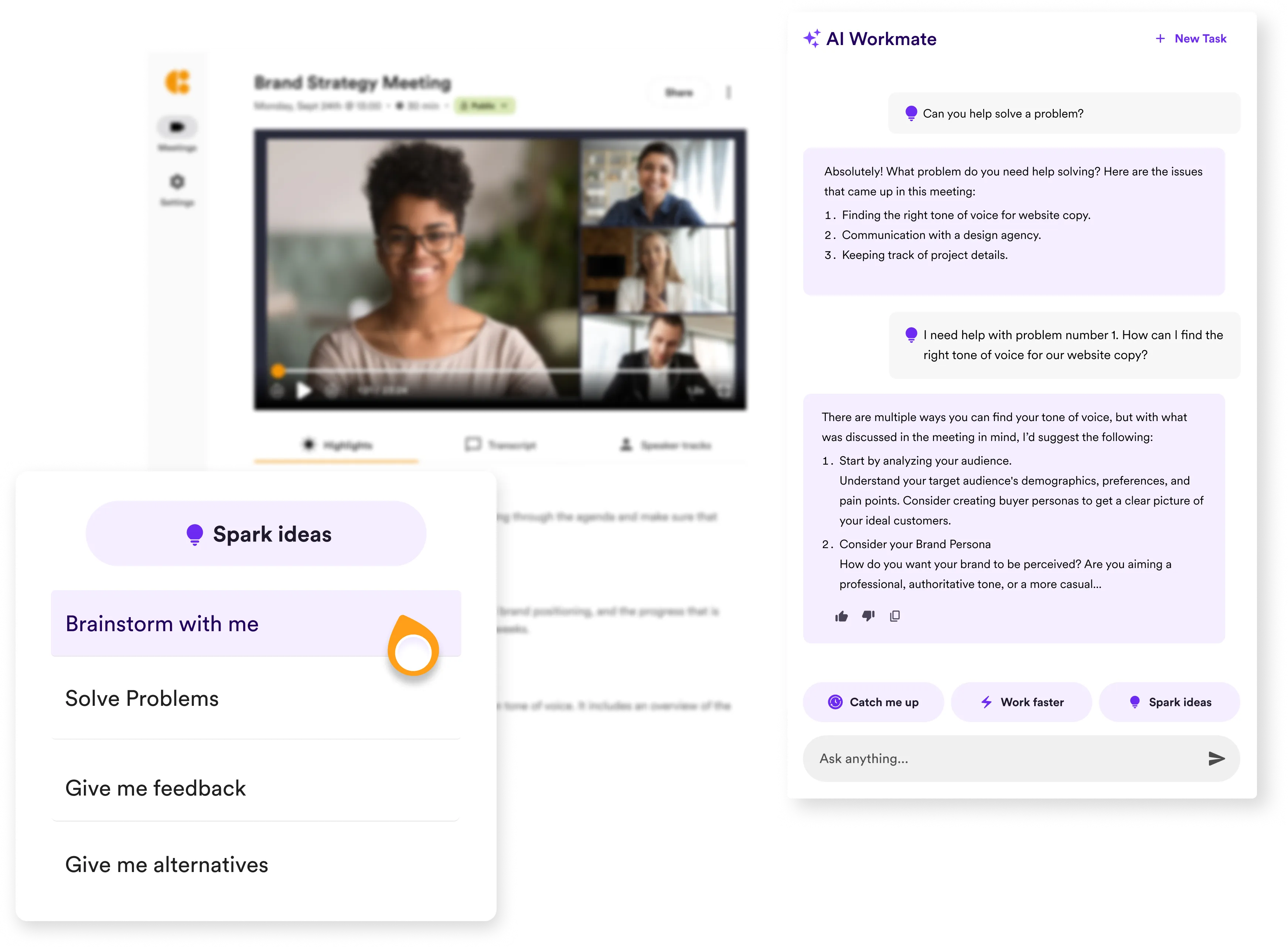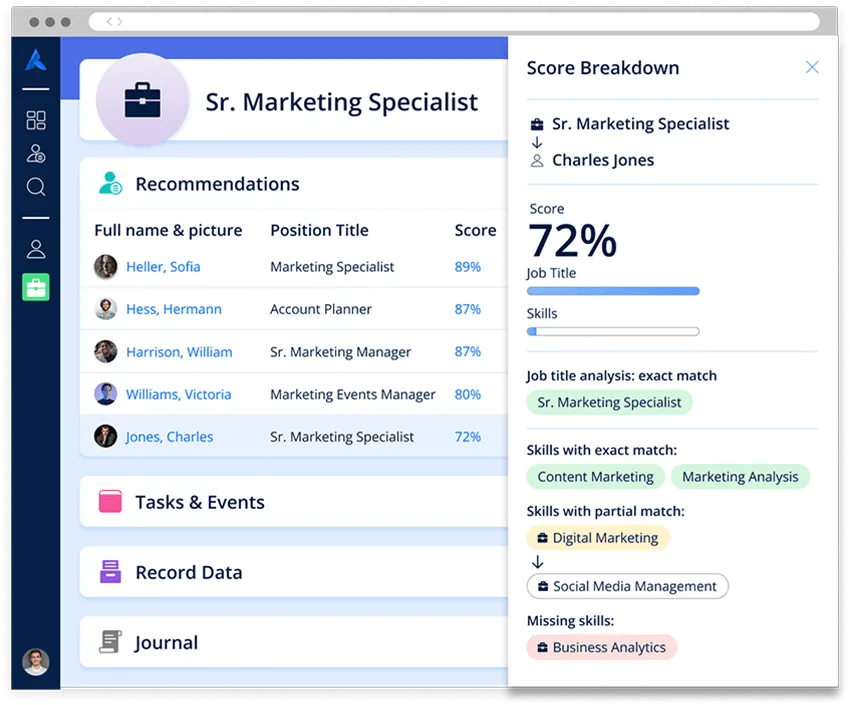+50 Best Performance Review Questions

Performance reviews can be daunting, but they are also one of the most powerful ways to ensure your employees stay engaged.
But, are you asking the right questions?
In this article, we’ll walk you through essential performance review questions that will help you identify strengths, address weaknesses, and align employee growth with your company's goals.
What makes a great performance review question?
A good performance review question goes beyond checking off tasks. It should encourage reflection and meaningful dialogue about the employee’s role, challenges, and achievements. It should also focus on uncovering specific details about your employee’s work :
- Specific and reflective: A good question doesn’t just ask for a yes or no answer. It should prompt the employee to explain their actions or decisions. For instance, instead of asking, “Did you meet your targets?”, try asking, “What specific strategies helped you achieve your goals this quarter?” This lets you see not only the results but the thought process behind them.
- Address strengths and weaknesses equally: It’s important to balance your review by looking at both what’s working and what needs improvement. You might ask, “What are the skills you feel most confident using in your role?” and then follow up with, “What areas do you think need further development?” This gives you a fuller picture of their abilities and highlights potential areas for training or support
- Focus on future growth: Reviews should always lead to action. You want to open a conversation about professional development and setting the stage for future performance improvements. This also ensures that your employees feel supported in their career growth.
Examples of Performance Questions

Performance review questions give you a clear understanding of how your employee is performing in their role. These questions focus on specific areas like job responsibilities, problem-solving, and meeting goals.
Here are 10 concrete performance review questions you can use:
- How effectively do you manage your time and prioritize tasks?
- What are your most significant achievements this quarter?
- Have you faced any challenges in meeting your goals? How did you overcome them?
- On a scale of 1-10, how would you rate your communication skills with your team?
- How do you handle tight deadlines and pressure at work?
- How would you rate your ability to meet project deadlines?
- What areas of your job do you find most rewarding?
- What areas of your role do you feel need improvement?
- How have you contributed to the team’s success this quarter?
- What goals would you like to set for the next review period?
Examples of Strength/Weakness Questions
You'll need to understand an employee’s strengths and weaknesses for their development and overall team performance. By asking thoughtful questions, you can identify areas where they excel and where they may need support.
Here's a list of 10 questions to help you evaluate strengths and weaknesses effectively:
- What do you consider your strongest skills in your current role?
- What challenges have you faced in your role, and how have you addressed them
- Which tasks or responsibilities do you find most challenging?
- Can you provide an example of a time when you overcame a significant obstacle at work?
- What feedback have you received from colleagues or managers regarding your strengths?
- What are some skills you haven’t fully developed yet but would like to improve?
- Which of your daily tasks do you feel could be improved, and how?
- How do you handle constructive criticism from colleagues or managers?
- What steps are you taking to improve in areas where you feel less confident?
- Are there resources or support that could help you overcome your current challenges?
Examples of Manager/Employee Relationship Questions

A strong relationship between managers and employees is key for a productive work environment. By asking the right questions, you can create a foundation of trust, open communication, and mutual respect.
These questions help you assess how well the employee feels supported and how the manager can improve their leadership approach.
Questions for Managers:
- Do you feel that your feedback is clear and actionable?
- How often do you check in with your team to offer support or feedback?
- What steps do you take to ensure open communication with your team?
- How do you tailor your management style to fit the needs of individual team members?
- How do you handle conflict or disagreements within your team?
- Do you regularly seek feedback from your team on your own performance?
- How do you motivate your team to reach their full potential?
- What actions do you take to recognize and reward high performance?
Questions for Employees:
- How do you feel about the feedback you receive from your manager?
- Do you feel comfortable discussing concerns or ideas with your manager?
- What do you think your manager does well in terms of supporting your work?
- What could your manager do differently to better support your performance?
- How often do you feel that your manager checks in on your progress?
- Do you feel that your manager understands your career goals?
- What could your manager do to improve team collaboration?
- Do you feel recognized for your contributions by your manager?
Examples of Job Satisfaction-Related Questions
Employee satisfaction is key to maintaining a motivated and engaged workforce. By asking targeted questions, you can better understand how employees feel about their roles, responsibilities, and the overall work environment.
Here are 10 job satisfaction-related questions to include in your performance reviews:
- What aspects of your job do you find most fulfilling?
- What aspects of your job do you find most challenging or frustrating?
- Do you feel that your role aligns with your career goals?
- How satisfied are you with the level of autonomy you have in your role?
- Do you feel recognized for your contributions?
- How do you feel about the company’s work culture and values?
- Do you feel that your workload is manageable?
- Are there any tools or resources that could improve your job satisfaction?
- What changes, if any, would you like to see in your current role?
- Do you feel that you have opportunities for growth and development?
Examples of Future Growth Questions

Focusing on an employee’s future growth during performance reviews is essential for career development and long-term satisfaction. These questions also allow you to identify training needs and provide guidance for professional development.
Here are 10 future growth-related questions to include in your performance reviews:
- What are your professional goals for the next 6-12 months?
- Where do you see yourself in the next 2-3 years?
- What skills would you like to develop to reach your future goals?
- Are there any projects or responsibilities you would like to take on to develop new skills?
- What resources or support do you need to achieve your career goals?
- How do you see your current role evolving in the future?
- What steps have you taken toward your professional development this year?
- Are there any leadership opportunities you’re interested in exploring?
- What challenges do you anticipate in reaching your goals, and how can we help?
- Do your personal goals align with the company’s objectives? If not, how can we bridge the gap?
Performance Review Question Reminder and Recorder: Noota

It can be time-consuming and prone to errors if you’re trying to remember every question and response manually from your performance reviews. This is where Noota comes in :
- Reminders for Key Performance Questions : With Noota, you never have to worry about forgetting to ask important questions during a performance review. Noota can remind you of the pre-set questions you want to cover, helping you maintain consistency across all reviews.
- Real-Time Transcriptions
Noota transcribes your review conversations in real-time. This means you don’t have to focus on taking notes, allowing you to fully engage with the employee during the review. - Structured Meeting Minutes
Once the review is over, Noota doesn’t just leave you with raw transcription data. It organizes the content into structured meeting minutes, categorizing responses based on the questions asked. This makes it easy to find key points, such as feedback on strengths, weaknesses, and future growth opportunities. - Easy Sharing and Collaboration
Noota allows you to easily share the minutes and transcripts with your team, enabling collaborative decision-making. Whether it's discussing next steps for an employee or simply sharing insights, Noota makes team communication smoother.
Want to stop worrying about missing a key point or scrambling to find notes from an earlier review? Try Noota for free.
Leverage your Interview Data
AI interview notes, scorecard, follow-up, ATS integration, and more...
Related articles

Forget note-taking and
try Noota now
FAQ
In the first case, you can directly activate recording as soon as you join a videoconference.
In the second case, you can add a bot to your videoconference, which will record everything.
Noota also enables you to translate your files into over 30 languages.

.svg)
.svg)
.webp)

.png)


.svg)
